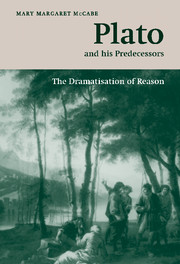6 - Outwitting the cunning man
Published online by Cambridge University Press: 15 December 2009
Summary
MICROCOSM AND MACROCOSM
God first (I shall come back to philosophy and farming in my final chapter). It is often supposed that all Plato's cosmic teleology is theistic, just as it is often supposed that he will make his theistic claims under the protective custody of a myth. If there are other stories to tell about myth, however, perhaps there are others about god, too. Indeed, if I am right that the Politicus myth invites a contrast between two mythologies, then the absence of god in the mythology of our era tells immediately against unthinking theism on Plato's part (and perhaps against thoughtful theism, too). Even if Plato would earlier have responded to the failings of Anaxagoras by adding to the mechanistic account of the universe an overseeing god (this is, if you like, giving Anaxagoras' Mind a job to do; cf. Phaedo 98b ff.), how far is this cosmological theology what we have in the Politicus and the Philebus?
At Philebus 28–30 Socrates offers an argument which seems at first to encourage a theistic view, that the cosmos is as it is by the agency of god. Socrates has been discussing the nature of limit and the unlimited in order to relegate the life of Philebus – a life which is barely a life, but rather the episodic existence of a mollusc – to what has no measure, to what is characterised by the more and the less.
- Type
- Chapter
- Information
- Plato and his PredecessorsThe Dramatisation of Reason, pp. 165 - 194Publisher: Cambridge University PressPrint publication year: 2000

